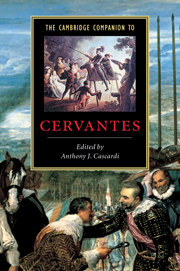Book contents
- Frontmatter
- 1 Introduction
- 2 The historical and social context
- 3 Cervantes and the Italian Renaissance
- 4 Don Quixote and the invention of the novel
- 5 The influence of Cervantes
- 6 Cervantes’ other fiction
- 7 Writings for the stage
- 8 Humor and violence in Cervantes
- 9 Psyche and gender in Cervantes
- 10 Cervantes and the New World
- Appendix: electronic editions and scholarly resources
- Index
- Series List
9 - Psyche and gender in Cervantes
Published online by Cambridge University Press: 28 May 2006
- Frontmatter
- 1 Introduction
- 2 The historical and social context
- 3 Cervantes and the Italian Renaissance
- 4 Don Quixote and the invention of the novel
- 5 The influence of Cervantes
- 6 Cervantes’ other fiction
- 7 Writings for the stage
- 8 Humor and violence in Cervantes
- 9 Psyche and gender in Cervantes
- 10 Cervantes and the New World
- Appendix: electronic editions and scholarly resources
- Index
- Series List
Summary
The title of this essay brings together two controversial yet crucial areas of study within Cervantes scholarship. The concepts of psyche and gender, as I apply them to Cervantes' works, encompass the literary representations of psychological complexes – such as the unconscious and the manifestation and repression of desire – and of the sex/gender system. Their dynamics permeate not only the author's fiction, but many of the assumptions underlying its major critical approaches. No reader of Cervantes can fail to observe his abundant examples of literal and literary madness, of visual and verbal illusions, and of fragmented and fractured selves. The multiple ambiguities in his fiction, as well as the appearance of numerous “deviant” women and their relations with equally anomalous male partners, open the literature to an increasing range of psychoanalytical and gender-inflected analyses. My purpose in this chapter, therefore, is to trace the emergence of psychology and gender as vital categories of analysis, to identify their critical function in Cervantes studies, and to investigate the intricate relations between them.
Since psychology and its applied methodology of psychoanalysis intend an investigation of the mind’s unconscious workings, psychoanalytical readings attempt to understand the verisimilar mental processes in fictional characters that sustain our interest and lead us to empathize with literary protagonists.
- Type
- Chapter
- Information
- The Cambridge Companion to Cervantes , pp. 186 - 205Publisher: Cambridge University PressPrint publication year: 2002
- 2
- Cited by



